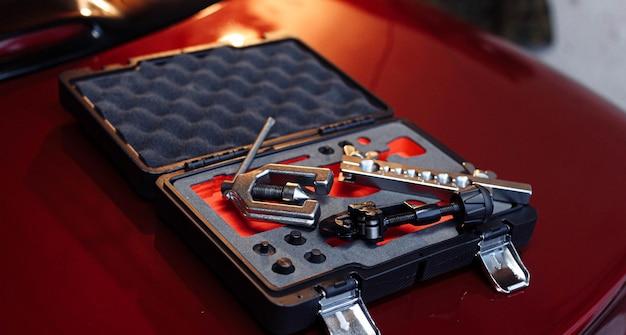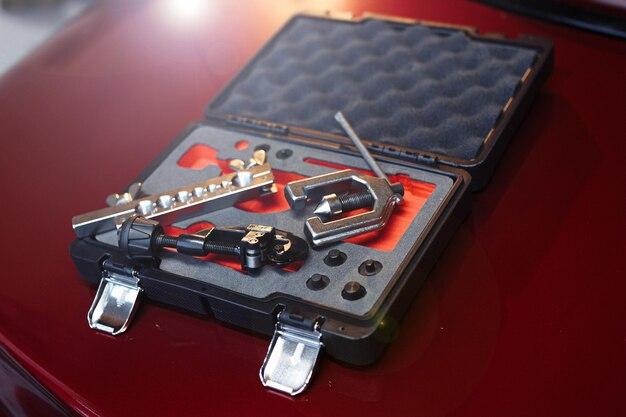Refrigerators have come a long way in terms of technology and environmental impact. The use of Freon, a common refrigerant, has raised concerns due to its harmful effects on the ozone layer. If you’ve ever wondered when they stopped using Freon in refrigerators or if modern freezers still use it, you’ve come to the right place. In this blog post, we’ll dive into the history of refrigerants, explore the transition from Freon to more eco-friendly options like R134a, and answer common questions like the cost of servicing a refrigerator with a Freon leak and the lifespan of these indispensable appliances. Join us as we unravel the fascinating world of refrigerator refrigerants.

When did they stop using Freon in refrigerators?
For many years, Freon has been the go-to refrigerant in refrigerators, keeping our food cold and our ice cream frozen. However, as we became more aware of its harmful effects on the environment, the need arose to find a safer and more environmentally friendly alternative. In this subsection, we will explore the timeline of when they stopped using Freon in refrigerators and the impact it has had on both the environment and our everyday lives.
The Rise and Fall of Freon
Back in the day, Freon was the superstar of refrigerants. It was developed by Thomas Midgley Jr. in the 1920s and quickly became the industry standard for its excellent refrigeration properties. It was used not only in household refrigerators but also in air conditioners and aerosol cans. Ah, the good old days when we didn’t think twice about what was inside our appliances!
The Environmental Wake-Up Call
By the late 20th century, scientists began sounding the alarm bells about the negative impact of Freon, particularly on the Earth’s ozone layer. Freon, also known as chlorofluorocarbons (CFCs), was found to be contributing to the depletion of the ozone layer, which protects us from harmful ultraviolet radiation. It was like a villain disguising itself in our favorite superhero’s cape.
The Montreal Protocol: A Game-Changer
In 1987, the international community came together and signed the Montreal Protocol. This agreement aimed to phase out the production and use of substances, including Freon, that were depleting the ozone layer. It was like a diplomatic superhero team-up!
The Transition to Safer Alternatives
Following the Montreal Protocol, appliance manufacturers had to find alternatives to Freon. One of the first replacements was hydrochlorofluorocarbon (HCFC), which was less harmful to the ozone layer but still had a negative impact. So the search continued for an even safer alternative.
The Rise of HFCs
Enter hydrofluorocarbons (HFCs), the current superheroes of refrigerants. HFCs do not deplete the ozone layer, so they were hailed as the saviors of our appliances. However, just like in the movies, there’s always a twist. While HFCs don’t harm the ozone layer, they are potent greenhouse gases, contributing to global warming. It’s like a never-ending battle to find the perfect refrigerant.
The Present and Future of Refrigerants
Fast forward to the present, where we find ourselves navigating the landscape of refrigerants in refrigerators. HFCs are still commonly used, but scientists and policymakers are actively researching and pushing for alternatives that are both ozone-friendly and climate-friendly. So, while we may not have the perfect solution just yet, progress is being made to ensure our refrigerators cool without harming the environment.
The transition away from Freon in refrigerators has been a journey driven by environmental concerns and international agreements. We’ve witnessed the rise and fall of Freon as we searched for safer alternatives. While HFCs have taken the baton, they are not without their drawbacks. The future holds promise for even greener refrigerants, and with continued efforts, we can make sure our appliances keep our food fresh and our planet healthier.

FAQ: When did they stop using Freon in refrigerators?
Welcome to our informative FAQ-style guide about the transition from using Freon in refrigerators to more efficient and environment-friendly refrigerants. Here, we’ll answer some common questions about this topic.
When did they stop using R134
R134, also known as tetrafluoroethane, replaced Freon (chlorofluorocarbon) as a common refrigerant in the early 1990s. Refrigerator manufacturers started to shift away from Freon due to its harmful impact on the ozone layer. R134 became the go-to refrigerant for a more sustainable future.
Do modern freezers use Freon
No, modern freezers don’t use Freon. In efforts to protect the Earth’s ozone layer and reduce greenhouse gas emissions, manufacturers have moved away from using Freon in favor of more environmentally friendly alternatives, such as R134a or R600a.
Is it cheaper to fix a refrigerator or buy a new one
The decision whether to repair or replace a refrigerator depends on various factors. Generally, if the repair cost exceeds 50% of the price of a new refrigerator, it’s more economical to buy a new one. However, consult with a professional technician to assess the severity of the issue and provide an accurate cost estimate.
What are the side effects of a Freon leak
Freon leaks can have detrimental effects on both the environment and human health. Inhaling Freon can cause symptoms like headaches, dizziness, nausea, and even asphyxiation in extreme cases. Additionally, Freon contributes to the depletion of the ozone layer, leading to climate change.
What refrigerant was used in the 70s
During the 1970s, a common refrigerant used in refrigerators was Freon-12, also known as dichlorodifluoromethane (CFC-12). However, its use was phased out due to the harmful impact it had on the ozone layer and was later replaced with more eco-friendly alternatives.
Do all refrigerators have Freon in them
No, not all refrigerators use Freon anymore. As environmental concerns grew, manufacturers began transitioning to more eco-friendly refrigerants like R134a or R600a. These newer refrigerants offer similar cooling capabilities while minimizing negative effects on the ozone layer.
How much does it cost to put Freon in a refrigerator
The cost of adding Freon to a refrigerator varies depending on the specific model and the technician’s rates. However, it’s important to note that adding Freon to a refrigerator may not always be the best solution. If your refrigerator has a leak, fixing the leak and replacing the refrigerant may cost more than investing in a new refrigerator altogether.
When was R134a banned
As of the year 2023, R134a has not been banned in the United States. However, its usage has significantly decreased due to its high global warming potential (GWP). Countries and regulatory bodies are encouraging the adoption of refrigerants with lower GWPs to mitigate environmental impact.
Do all refrigerators have flammable refrigerant
No, not all refrigerators use flammable refrigerants. While some newer models may use flammable refrigerants like R600a to reduce environmental impact, the majority of existing refrigerators still use non-flammable alternatives such as R134a or R32. Safety standards and regulations ensure that the refrigerants used in appliances are safe for consumer use.
Is it worth fixing a refrigerator
The decision to repair or replace a refrigerator depends on factors such as the age of the appliance and the extent of the issue. If your refrigerator is relatively new and the repair cost is reasonable, fixing it can extend its lifespan. However, older refrigerators with major issues may be more cost-effective to replace with a newer, energy-efficient model.
When did refrigerators start using R134A
Refrigerators began using R134a, a more environmentally friendly refrigerant, in the early 1990s. This shift marked a crucial transition away from harmful chlorofluorocarbon (CFC) refrigerants like Freon, promoting sustainability and mitigating damage to the ozone layer.
What does a Freon leak in a refrigerator smell like
Freon itself is odorless. However, when a refrigerator has a leak, it often produces a distinct chemical scent similar to nail polish remover. If you notice this smell or suspect a Freon leak, it’s crucial to address the issue promptly to prevent any negative effects on your health and the environment.
What happens if you mix R134a and R-1234yf
Mixing R134a and R-1234yf, both common refrigerants, is not recommended. These refrigerants have different chemical compositions and properties. Mixing them could result in an unstable and potentially hazardous mixture, potentially leading to system malfunction or damage.
What refrigerant is used in old refrigerators
Older refrigerators commonly used refrigerants like Freon-12 (CFC-12) or ammonia. However, these refrigerants have been largely phased out due to their harmful effects on the ozone layer and replaced with more eco-friendly alternatives such as R134a.
Can a Freon leak make you sick
Yes, a Freon leak can make you sick. Inhaling Freon can cause symptoms such as dizziness, nausea, headaches, and even asphyxiation in severe cases. Freon exposure should be taken seriously, and if you suspect a leak, it’s crucial to address it promptly while ensuring proper ventilation.
Do modern refrigerators have Freon
No, modern refrigerators no longer use Freon. Environmental regulations and the desire for energy efficiency have driven manufacturers to adopt more eco-friendly refrigerants like R134a or R600a. These refrigerants offer effective cooling capabilities while minimizing harm to the ozone layer.
What color is Freon in a refrigerator
Freon itself is a colorless gas, so you won’t see it as a distinct color inside your refrigerator. However, if your refrigerator has a leak, you may notice a yellowish, oily residue near the source of the leak, which can indicate the presence of a refrigerant like Freon.
Is it safe to use an old refrigerator
Using an old refrigerator may not be as safe or energy-efficient as modern models. Older refrigerators tend to consume more electricity, leading to higher utility bills, and may lack the safety features found in newer models. Additionally, older refrigerators may use outdated refrigerants with higher ozone-depleting potential.
Is it worth replacing a compressor on a refrigerator
Replacing a compressor on a refrigerator can be a costly repair, often amounting to a significant portion of the appliance’s value. Consider factors such as the age of the refrigerator and the cost of the repair. If the refrigerator is older or additional major issues exist, it may be more cost-effective to invest in a new one.
How do I know if my refrigerator has Freon
As a consumer, you won’t typically know if your refrigerator has Freon or another refrigerant inside unless there is a leak. If there’s a strong chemical odor or noticeable oily residue near the appliance, it’s essential to contact a professional technician to safely assess and address the issue.
How old do refrigerators last
The lifespan of a refrigerator can vary depending on factors such as usage, maintenance, and brand. However, on average, a well-maintained refrigerator can last around 10 to 15 years. Regular cleaning, proper temperature control, and timely repairs can help prolong its lifespan.
Will Freon poison my food
When used as intended and stored properly, Freon, or any refrigerant, should not directly poison food. However, if a refrigerator has a leak, it’s important to address it promptly to prevent possible contamination and to ensure the appliance functions properly to keep your food at safe temperatures.
Can a fridge work without Freon
No, a fridge cannot function without a refrigerant. Refrigerants like Freon or alternatives such as R134a are crucial for absorbing heat from the fridge’s interior and releasing it outside, maintaining the desired cool temperature. Without a refrigerant, the cooling process would not occur, rendering the fridge ineffective.
We hope this FAQ section has helped answer your questions regarding the transition away from Freon in refrigerators. By embracing more environmentally friendly alternatives, we not only protect the ozone layer but also ensure efficient and sustainable cooling for our homes.